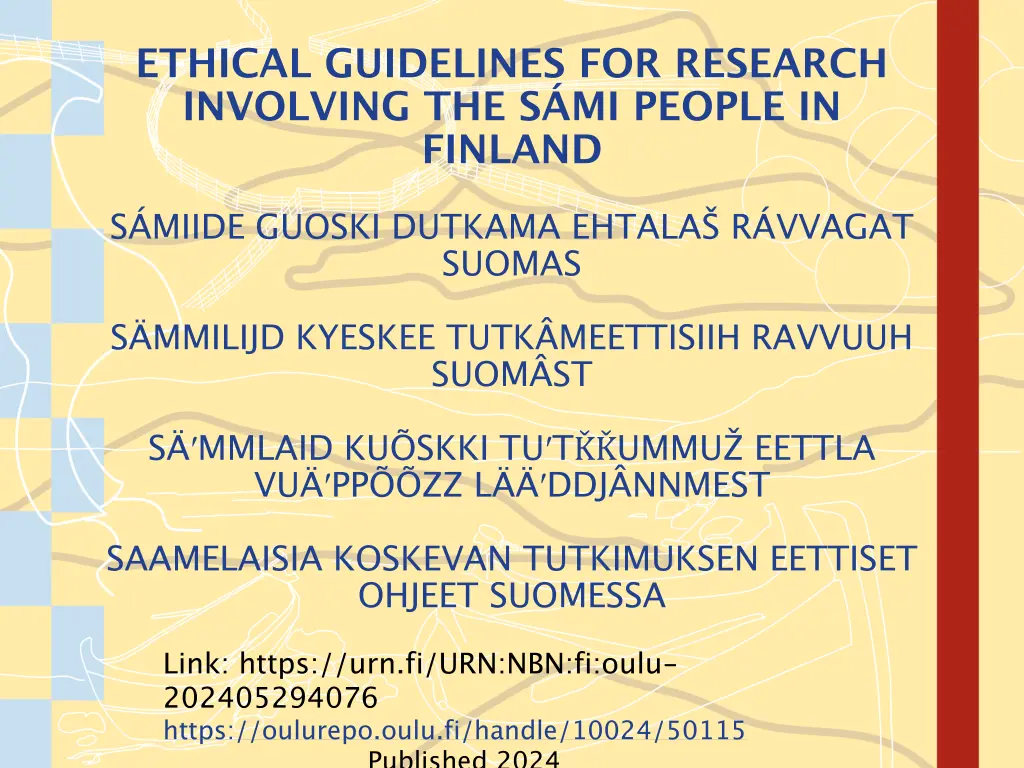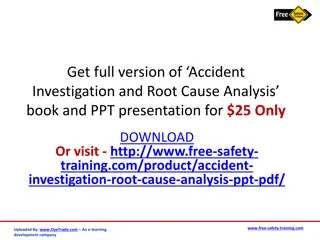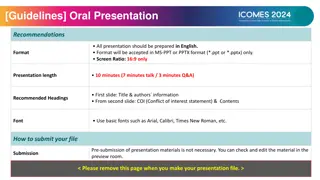
Ethical Guidelines for Research Involving Sámi People in Finland
These ethical guidelines provide a framework for research involving the Sámi people in Finland, aiming to ensure culturally safe research conditions and respectful engagement. The guidelines emphasize the importance of building an informed dialogue between the scientific community and the Sámi society, based on mutual understanding, trust, and the Sámi values of reciprocal communication. The document also highlights the need for ongoing updates to adapt to changing circumstances and needs.
Download Presentation

Please find below an Image/Link to download the presentation.
The content on the website is provided AS IS for your information and personal use only. It may not be sold, licensed, or shared on other websites without obtaining consent from the author. If you encounter any issues during the download, it is possible that the publisher has removed the file from their server.
You are allowed to download the files provided on this website for personal or commercial use, subject to the condition that they are used lawfully. All files are the property of their respective owners.
The content on the website is provided AS IS for your information and personal use only. It may not be sold, licensed, or shared on other websites without obtaining consent from the author.
E N D
Presentation Transcript
ETHICAL GUIDELINES FOR RESEARCH INVOLVING THE S MI PEOPLE IN FINLAND S MIIDE GUOSKI DUTKAMA EHTALA R VVAGAT SUOMAS S MMILIJD KYESKEE TUTK MEETTISIIH RAVVUUH SUOM ST S MMLAID KU SKKI TU T UMMU EETTLA VU PP ZZ L DDJ NNMEST SAAMELAISIA KOSKEVAN TUTKIMUKSEN EETTISET OHJEET SUOMESSA Link: https://urn.fi/URN:NBN:fi:oulu- 202405294076 https://oulurepo.oulu.fi/handle/10024/50115 Published 2024
Working group Lydia Heikkil , S mediggi Rauna Kuokkanen, University of Lapland Veli-Pekka Lehtola (2018-2023), University of Oulu P ivi Magga (2018 2020), Siida, S mi Museum Sigga-Marja Magga, University of Oulu Janne N kk l j rvi, S mi Education Institute SOGSAKK Sanna Valkonen (2018 2023), University of Lapland Pirjo Kristiina Virtanen, Helsinki University Advisory board 16 members, negotiations with TENK Continuing dialogue with S mi society: Numerous hearings with S mi communites, webropol questionnaire, S mi Parliament Consensus princinple https://www.ulapland.fi/FI/Kotisivut/Saamelaisia-koskevan- tutkimuksen-eettiset-ohjeet-
Starting point and need Shared sovereignty: S mi right to self-determination as an Indigenous people (Pl 17.3 ) and Freedom of science guaranteed by the Constitution (Pl 16 ) Historical and present-day disproportionate power structures, that affect the implementation and settings of research
Objectives and application Building an ethically better informed dialogue between the scientific community and the S mi society Quality of research Creating culturally safe research conditions and implementation of research oadjebasvuohta (Northern S mi), torvol vuot (Inari Saami) and staanvu tt (Skolt Saami) Living document; to be updated according to the changing situation and needs
4 Smi values - Four Gs 1. Gulahallan / Addiitt ll m / Kulst llm Reciprocal communication and engagement: a traditional S mi way of interacting Active listening, mutual understanding Relationships based on trust Aiming for oadjebasvuohta (cultural safety)
2.Guorahallan ja vihkkedallan / Kuorttllm j viekkiist ll m/ Tu mmst llm ja vie ss llm Assessment of the Benefits and Risks of Research and the Positionality of the Researcher Locating the researcher's position and reflecting on the research tradition Consideration from several perspectives: relevance, collective risks and harms Reflecting on the research questions, theoretical framework and methods from the perspective of the S mi people
3. Gudnejahttin ja rvvusatnin / Kunnijttem j rvustanneem / Ciist st da rvast nnm Appreciation of and Respect for S mi Society and Knowledge Respect for S mi culture and society (recognition, practical applications) Acknowledging and recognizing the S mi languages, and S mi knowledge, traditions and rights Respect the S mi land relations and social relations, including traditional governance institutions Treating S mi people as equal partners
4. Geatnegasvuohta dieu mhcaheapmi ja juohkimii / Kenig svuot mac tti j jyehi ti u / l temvu tt te maacctumm a da ju kkm e Obligation to Return and Share the Information Responsibility and duty towards S mi society and living environment Responsibility and obligation to share the research results with the S mi community that participated in the research (communal ownership of data, access to, decision making of use)
Main notes Guidelines apply to all research that concerns the S mi people, S mi society and S mi communities in Finland (S pmi). Including research conducted in S mi Homeland. Researchers self-regulation Collective orientation in addition to individual Diversity of the S mi and S mi society; traditional social and customary law- based systems still in form
Natureculture Indigenous views share holistic conceptions where nature and culture are inseparable According to the government's proposal (HE 309/1993 vp) of Finnish Constitution the purpose of the fundamental rights provision is to secure the preservation of the entire original S mi cultural form . The S mi cultural form also includes their traditional livelihoods. It not only secures the maintenance and preservation of the language and culture, but also their development . The Constitutional Law Committee stated that S mi culture also includes modern forms of application of traditional livelihoods (PeVL 38/204 vp) (italics mine)
Particular concerns Emphasized (self-)reflexivity and interactivity The responsibility of researchers to familiarize themselves with S mi culture and S mi society well in advance and to clarify matters Contacts, community consent, risks and benefits (collective perspective in addition to individual), cultural and linguistic capacities, relevant contents, research methods and means, collective rights of the research partners, including the storage and availability of research material Strives to avoid unnecessary burden on the S mi communities by familiarizing himself with previous studies on the subject Extensive involvement >< load capacity of communities and individual groups
Particular concerns FPIC: If the research is extensive or conducted with an identifiable S mi community or in its area, the researcher/group is to request the community s consent to their reserach. S mi Parliament in Finland and Skolt S mi Assembly have procedures for seeking communal consent. S mi collective cultural heritage and traditional knowledge: S mi cultural norms regarding collection and sharing of knowledge. The intellectual property rights of the S mi: Traditional knowledge and cultural heritage that is collectively produced and shared (incl. hunting, fishing, gathering and reindeer grazing; sacred places and the related knowledge) >UN: Declar. of Indigenous Peoples Rights 2017, CBD 1992, Art. 8 (j); Akwe:Kon Guidelines 2004, Tkharihwaie:ri Code of Conduct 2011






















